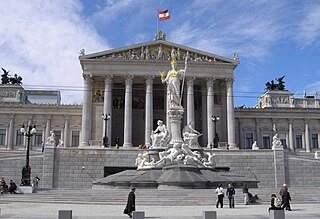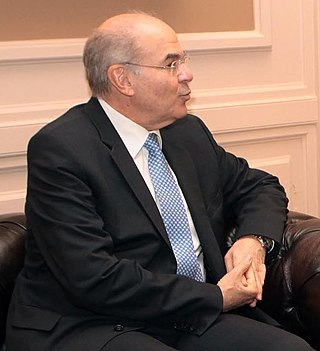Labour laws, labour code or employment laws are those that mediate the relationship between workers, employing entities, trade unions, and the government. Collective labour law relates to the tripartite relationship between employee, employer, and union.

European Union law is a system of rules operating within the member states of the European Union (EU). Since the founding of the European Coal and Steel Community following World War II, the EU has developed the aim to "promote peace, its values and the well-being of its peoples". The EU has political institutions, social and economic policies, which transcend nation states for the purpose of cooperation and human development. According to its Court of Justice the EU represents "a new legal order of international law".
Indirect effect is a principle of the European Union (EU) law, whereby national courts of the member states of the EU are required to interpret national law in line with provisions of EU law. The principle of indirect effect contrasts with the principle of direct effect, which, under certain conditions, allows individuals to invoke the EU law itself before national courts.
Labor rights or workers' rights are both legal rights and human rights relating to labor relations between workers and employers. These rights are codified in national and international labor and employment law. In general, these rights influence working conditions in the relations of employment. One of the most prominent is the right to freedom of association, otherwise known as the right to organize. Workers organized in trade unions exercise the right to collective bargaining to improve working conditions.

European Union citizenship is afforded to all citizens of member states of the European Union (EU). It was formally created with the adoption of the 1992 Maastricht Treaty, at the same time as the creation of the EU. EU citizenship is additional to, as it does not replace, national citizenship. It affords EU citizens with rights, freedoms and legal protections available under EU law.

The European single market, also known as the European internal market or the European common market, is the single market comprising mainly the 27 member states of the European Union (EU). With certain exceptions, it also comprises Iceland, Liechtenstein, and Norway and Switzerland. The single market seeks to guarantee the free movement of goods, capital, services, and people, known collectively as the "four freedoms". This is achieved through common rules and standards that all participating states are legally committed to follow.
In Europe, positive action are measures which are targeted at protected groups in order to enable or encourage members of those groups to overcome or minimise disadvantage; or to meet the different needs of the protected group; or to enable or encourage persons in protected groups to participate in an activity. In the United Kingdom in the Equality Act 2010 ss 158-159, the term is used in the context of employment to allow selection of a candidate from an "under-represented" group, so long as he or she is no less than equally qualified compared to another potential candidate that is not from the under-represented group.

Austrian nationality law details the conditions by which an individual is national of Austria. The primary law governing these requirements is the Nationality Law, which came into force on 31 July 1985.
The freedom of movement for workers is a policy chapter of the acquis communautaire of the European Union. The free movement of workers means that nationals of any member state of the European Union can take up an employment in another member state on the same conditions as the nationals of that particular member state. In particular, no discrimination based on nationality is allowed. It is part of the free movement of persons and one of the four economic freedoms: free movement of goods, services, labour and capital. Article 45 TFEU states that:
- Freedom of movement for workers shall be secured within the Community.
- Such freedom of movement shall entail the abolition of any discrimination based on nationality between workers of the Member States as regards employment, remuneration and other conditions of work and employment.
- It shall entail the right, subject to limitations justified on grounds of public policy, public security or public health:
- The provisions of this article shall not apply to employment in the public service.

Vassilios Skouris is a Greek judge who was President of the European Court of Justice from 2003 to 2015. A European legal scholar, he served briefly in the government of Greece as Minister of the Interior in 1989 and again in 1996. He is professor at the Law School of the Aristotle University and at Bucerius Law School in Hamburg, Germany.

The Citizens’ Rights Directive 2004/38/EC sets out the conditions for the exercise of the right of free movement for citizens of the European Economic Area (EEA), which includes the member states of the European Union (EU) and the three European Free Trade Association (EFTA) members Iceland, Norway and Liechtenstein. Switzerland, which is a member of EFTA but not of the EEA, is not bound by the Directive but rather has a separate multilateral sectoral agreement on free movement with the EU and its member states.
The NRW Trophy is an annual international figure skating competition organized by the Skating Union of North Rhine-Westphalia and since 2007, it has been sanctioned by the Deutsche Eislauf Union and the International Skating Union. It is held every autumn at Westfalenhallen in Dortmund, Germany. Medals are awarded in the disciplines of men's singles, women's singles, pair skating, and ice dance. The competition is held in two parts. The Ice Dance Trophy is held for ice dance levels pre-novice to senior in early November. The Figure Skating Trophy is held for singles and pairs skating levels novice to senior in late November or early December.
Metock v Minister for Justice, Equality and Law Reform (2008) C-127/08 is a European Union law case, significant in Ireland and Denmark, on the Citizens Rights Directive and family unification rules for migrant citizens. Citizenship of the European Union was established by Article 20 of the Treaty on the functioning of the European Union (TFEU) and the Citizenship Directive 2004/38 elaborates the right of Union citizens and their family members to move and reside freely in the territory of a member state, consolidating previous Directives dealing with the right to move and reside within the European Community (EC).

Laval un Partneri Ltd v Svenska Byggnadsarbetareförbundet (2007) C-341/05 is an EU law case, relevant to all labour law within the European Union, which held that there is a positive right to strike. However, it also held that the right to strike must be exercised proportionately and in particular this right was subject to justification where it could infringe the right to freedom to provide services under the Treaty on the Functioning of the European Union article 56.
Werhof v Freeway Traffic Systems GmbH & Co KG (2006) C-499/04 is a European labour law case concerning the minimum floor of requirements in the European Union for the enforceability of a collective agreement after a transfer of a business.

Omega Spielhallen und Automatenaufstellungs-GmbH v Oberbürgermeisterin der Bundesstadt Bonn (2004) C-36/02 is an EU law case, concerning the freedom to provide services and the free movement of goods in the European Union.
Hendrix v Raad van Bestuur van het Uitvoeringsinstituut Werknemersverzekeringen (2007) C-287/05 is an EU law case, concerning the free movement of workers in the European Union.
Finanzamt Köln Altstadt v Schumacker (1995) C-279/93 is an EU law case, concerning the free movement of workers in the European Union.
Dano v Jobcenter Leipzig (2014) C‑333/13 is an EU law case, concerning the free movement of citizens in the European Union.






